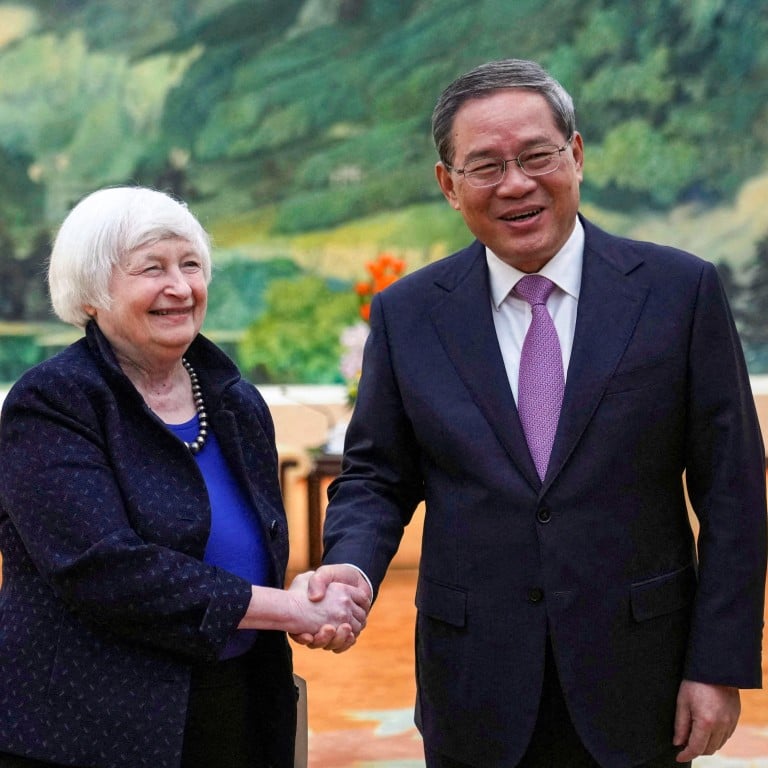
US should not politicise trade issues, China’s Li Qiang tells Janet Yellen in response to ‘overcapacity’ concerns
- Chinese Premier Li urges Washington to view industrial capacity ‘objectively’ in meeting with US Treasury Secretary Yellen in Beijing
- Yellen, who is on a five-day visit to China, says the two countries should not avoid ‘tough conversations’
“The development of China’s new energy industry will make an important contribution to the global green and low-carbon transformation,” Li said.
“We hope the US could work with China to adhere to the basic market economy norms of fair competition and open cooperation, while refraining from politicising economic and trade issues or overstretching the concept of national security,” Li said.
US, China to talk more on ‘overcapacity’: Treasury chief Yellen in Guangzhou
Yellen said ahead of the meeting that the countries should not avoid “tough conversations” in managing their differences, according to the US Treasury Department, which described the talks as “frank and productive”.
“The secretary provided her views on the shared objective of a healthy economic relationship that provides a level playing field for workers and businesses in both the US and China,” it said.
“As the world’s two largest economies, we have a duty to our own countries and to the world to responsibly manage our complex relationship and to cooperate and show leadership on addressing pressing global challenges,” Yellen said ahead of the meeting with Li, according to the department.
“While we have more to do, I believe that, over the past year, we have put our bilateral relationship on more stable footing. This has not meant ignoring our differences or avoiding tough conversations. It has meant understanding that we can only make progress if we directly and openly communicate with one another,” she added.
‘Crucial’ for US, China to work together: Treasury chief Janet Yellen
Li told Yellen that strengthening economic and trade cooperation was of great significance to both countries as well as global economic growth.
He said he hoped the two sides could strengthen communication and find ways to manage and resolve differences so that China-US economic and trade cooperation could be “stable, smooth and efficient”.
China is ready to step up policy coordination with the US on issues such as climate change, Li said.
“China hopes the two countries can be partners, not adversaries,” he added.
The meeting came after two days of talks between Yellen and Chinese Vice-Premier He Lifeng in the southern industrial hub of Guangzhou, where they discussed issues related to overcapacity and agreed to hold “intensive exchanges” to address economic and financial challenges.
Yellen said in Guangzhou that excessive Chinese exports could undercut American interests and lead to “global spillovers”, while Beijing said it had responded fully “to the production capacity issue” and expressed “serious concerns” about US trade restrictions against China.
Beijing warned about the risks of overcapacity in some sectors as a potential drag on the economic recovery during a key economic conference in December.
The issue, highlighted by blockbuster exports of new energy products last year, has triggered concerns in the EU and US that China’s dominance might crowd out their domestic industries.
The European Union has launched an anti-subsidy probe into Chinese electric vehicles and is likely to impose punitive tariffs, dealing a major blow to bilateral relations.
EU follows US move to assess China’s dominance of legacy chips
Economists and analysts have warned about the risks of an alliance to put pressure on Beijing.
“The Western countries, to a large extent, have reached consensus to impose increasingly stringent restrictions on Chinese green energy technology and products, and they have gradually unveiled specific measures,” said Shi Yinhong, a Beijing-based expert on US-China relations.
“It marks a substantial addition to the [American] ‘small yard, high fence’ tech and trade curbs, which is unlikely to be reversed. Meanwhile, China is also unlikely to change its priorities on economic and technological advancement,” Shi said.
On Sunday afternoon, Yellen met professors and students at Peking University’s National School of Development, where she underscored the importance of communication between the two countries.
“As the United States and China have worked to put our economic relationship on surer footing, the work of deepening our communication has been critical,” Yellen said ahead of a round table talk with professors, according to the US Treasury Department.
She said she had “frequent” discussions with senior Chinese government officials, adding that the Economic and Financial Working Groups – a platform for the two countries to discuss economic and financial policy matters – have met regularly since they were established last autumn.
Recalling her time in academia, Yellen said her experience in considering new ideas had benefited her as she became a policymaker and government official focused on a “pragmatic” approach to difficult problems.


